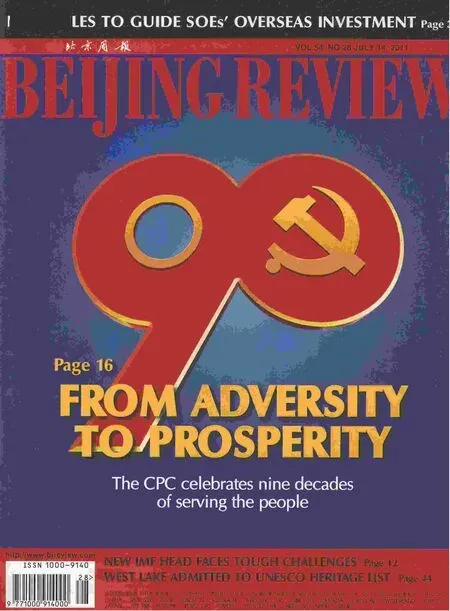Budgeting for Travel
By DING WENLEI
By LAN XINZHEN
Budgeting for Travel
By DING WENLEI
Websites provide enhanced services as they look to profit from China’s ballooning travel market
Overnight, the father found the omnipresent Internet helped his daughter plan the trip, from booking the flight to making reservations at a highly recommended budget hotel. Hu even found interesting attractions and restaurants at every stop of the vacation.
When asked how she’d managed to organize the trip so quickly, Hu opened a number of websites on her iPad that her father had never heard of before. Daodao.com had helped Hu gather information for hotels; Qunar.com allowed her to find discounted airfares and cheap hotel deals; Uzai.com recommended travel routes; and Lvmama.com provided information on travel destinations.
Hu’s father had previously only known of two online travel agencies, Nasdaq-listed Ctrip.com and Elong.com. Those two hotel reservation and fl ight booking sites have dominated the market for years but have had to make room as more companies enter the arena.
China’s online travel market is heating up amid a national e-commerce investment boom.But online travel services didn’t receive a decisive boost until about two years ago.
From 2009 to 2010, many start-up travel websites all fi nished two or three rounds of fundraising, said statistics from equity investment consulting company Zero2IPO Group.And major Internet companies, such as B2B marketplace Alibaba, instant messaging platform Tencent and search engine Baidu,either launched similar services or invested in major players for future cooperation based on their complementary strengths.
Opportunities worth many billions of dollars lie ahead for Ctrip and its peers, but they have to prove their versatility in order to grab more customers.

CFP
Explosive growth
China’s tourism market is burgeoning.China became the world’s third largest inbound tourism destination last year, said the latest edition of the United Nations World Tourism Organization annual report. The organization predicts China will surpass France as the largest tourist destination by 2015.
China also emerged as the world’s third biggest international tourism spender, with expenditures multiplying four times since 2000, said the report.
Domestically, Internet applications have continued to seep into the tourism industry.E-commerce solutions contributed to 3.3 percent of the entire Chinese travel sales last year and will reach 4.6 percent by 2012, said a report on China’s travel e-commerce by entertainment and tourism consulting company Entgroup.
While some airline companies, hotels and travel agencies are reinforcing their direct sales efforts online, others are reach
ing more customers by opening stores at large e-commerce platforms such as Taobao.com and 360buy.com. Taobao,China’s largest C2C marketplace, launched its travel channel in May 2010, allowing airline companies, hotels and travel agencies to sell tickets or hotel rooms directly from their stores.
Reservations made at of fi cial websites of airline companies, hotels or travel agencies stood at 32.5 billion yuan ($5 billion), or 84 percent of all online sales, and those made with online distributors such as Ctrip and Elong amounted to 6.1 billion yuan ($938.5 million), or 15.8 percent, said the Entgroup report.In total, the travel e-com
merce market reached a value of 39 billion yuan ($6 billion)in 2010, up 42 percent year on year, and will grow 30 percent annually to reach 68 billion yuan ($10.5 billion) by 2012,said the report.
Major players
In June, China’s search
engine giant Baidu announced a $306-million investment in Qunar, its largest investment to date, while the country’s largest Internet company Tencent bought a 30-percent stake in Elong for $84.4 million in May. This has inspired a lot of discussion about who will rise to challenge market leader Ctrip’s dominance.
Qunar offers a specialized search engine focusing on product and pricing comparison,presenting available options in its search results and redirecting users to other distributors or travel agencies.
Its revenue comes mainly from advertising and traffic redirection, unlike Ctrip,which makes pro fi ts largely on commissions from selling air tickets and hotel rooms.
Baidu, China’s largest portal to online content and services, controls nearly 80 percent of China’s search traffic and boasts a diversity of applications based on that traf fi c.
“Qunar chose Baidu because of its unmatchable resources and huge search traf fi c,which will allow us to cooperate in diverse ways,” said Zhuang Chenchao, CEO of Qunar.
The partnership will get Qunar more traffi c and advertising, and help Baidu improve its search results by leveraging Qunar’s travel-related search technology and content.
But Morgan Stanley said the deal has had a limited impact on Ctrip and maintained Ctrip’s stock “overweight” rating in its June 27 report.
“We do not view Qunar as a direct competitor to Ctrip,” the report said. “Ctrip does not rely heavily on third-party search engines to win new customers, since nearly 60-70 percent of these are word of mouth and direct sales. In addition, Ctrip enjoys a loyal customer base and generates 70-80 percent of sales from repeat customers.”
And Qunar targets price-sensitive customers, while 70 percent of Ctrip’s sales come from business travelers and high-end personal travelers, said the report.
Ctrip criticizers focus on its high commission rate, which mainly comes from its high labor costs. Unlike its overseas counterparts which complete their sales mostly online, Ctrip has 80 percent of its 10,000 workforce answering calls to conclude a large portion of deals.
In contrast, Qunar has less than 700 employees. And Qunar is free from additional operating costs common for traditional B2C companies such as logistics burdens from goods transportation, storage and delivery.
“The fact Qunar as a light-asset company boasts of a gross profit rate of 85 percent makes it a best investment targets,” Zhuang said.
Qunar may not compete with Ctrip directly, but Elong does, especially after Tencent partnered with Elong to make its first foray into the online travel market.Tencent, China’s largest instant message service provider, has 674 million users.
While Ctrip is busy increasing stakes in hotels, Elong will use Tencent’s investment to acquire small hotel reservation sites, said Elong’s CEO Cui Guangfu.
Hotel reservations are Elong’s core business, accounting for 68 percent of its total revenue in the fi rst quarter of this year. For five consecutive quarters, Elong has grown faster than Ctrip in terms of hotel sales,and online reservations will exceed dial-in reservations in volume in the second quarter, becoming the major source of Elong’s growth, said Cui.

WISE OLD OWL: Travel website Daodao.com shares the same owl logo with its parent company, Tripadvisor, the world’s largest travel site that allows customers to gather travel information, post reviews and engage in interactive travel forums
Elong now boasts the largest hotel coverage in China. It had established a partnership with 20,000 hotels in 700 cities nationwide by May 31, according to its financial statements. Through Elong’s platform, customers have access to more than 135,000 international hotels on Expedia, the world’s largest online travel site, which is Elong’s largest shareholder with a 56-percent stake.
Key to success
Baidu and Tencent have chosen to invest in a market leader instead of launching similar services by themselves because “they don’t have the genes to do e-commerce,”said Chen Shou, an analyst with information technology consulting firm Analysys International in a21st Century Business Heraldreport.
Technology is a barrier too. A vertical search engine, like that used at Qunar, focuses on a speci fi c segment of online content and is distinct from a general Web search engine, like Baidu, Hong Bo, an observer of the information technology industry, told theNational Business News.
Even if Baidu can overcome technological barriers, there are operational costs—a team should be organized to collect and process all kinds of information to tailor products for airline companies and hotels,which will also demand coordination efforts between Baidu’s departments, Hong said.
Smooth integration of both sides’complementary strengths and a distinctive business focus are the key to the success of these kinds of investments, Chen said.
But Chen said he didn’t think it’s possible to surpass Ctrip in the near future because of “a lack of distinctive and diverse business models that are as successful as Ctrip’s.”
Usually there are four focuses of travel sites: hotel reservation and air ticket booking,travel-related search, travel information and travel sharing community.
And most of China’s travel websites are crowded in the first two categories. “They provide solutions to questions like how to travel to the destination and where to stay,and seldom address issues like what to see and where to eat,” said Lvmama’s founder Hong Qinghua.
That’s where small travel sites like Lvmama and Uzai began to innovate and challenge market leaders.
With extensive consulting experience in scenic attraction design and planning,Hong moved into the online travel business by helping managers of scenic attractions to do precise marketing. Lvmama has signed contracts with more than 3,000 scenic attractions, with several million registered users.
Uzai was designed as a travel planner.“We are not a flea market where customers are left on their own about what to buy.Instead, we select competitive travel routes and create different vacation packages to meet varied needs,” said Li Daishan, founder of Uzai.com.
Innovation will help travel websites find a distinctive business model. But like technology, the business model is replicable and the ultimate answer to success is with the team’s capabilities in executing projects,said Zhang Dian, CEO of online travel fi rm Hubs1.
an iPad, a gift from her mother. Her father gave her something not so tech-heavy: a piece of paper with a travel agent’s phone number. But the paper held promise—Hu’s father said the family would be going on a vacation and Hu would be in charge of planning the trip.
By LAN XINZHEN

